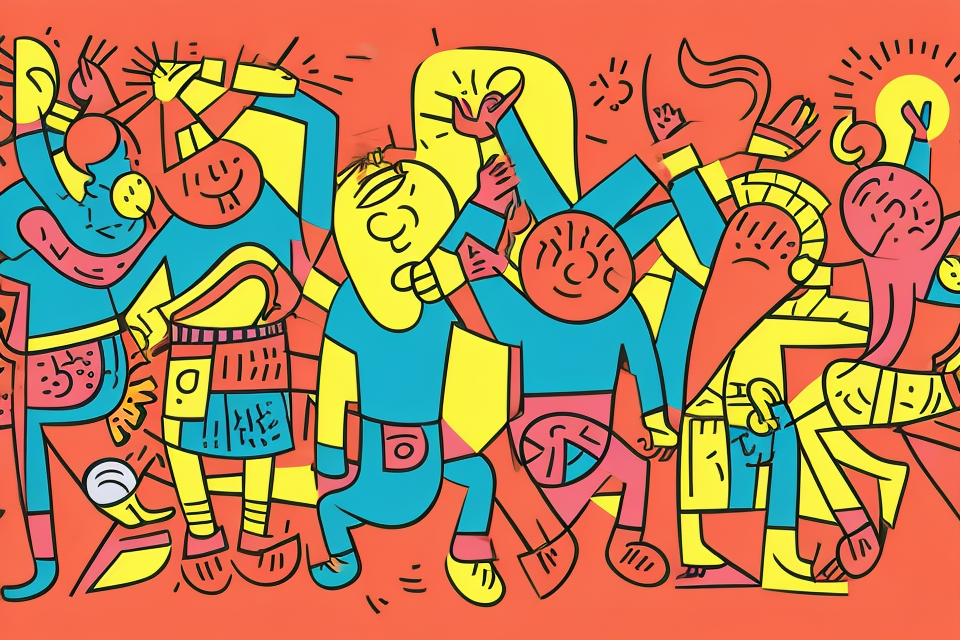Have you ever wondered what it would be like to step out of your comfort zone and immerse yourself in a completely different culture? From trying new foods to learning new languages, discovering new cultures can be an exhilarating and enriching experience. In this article, we will explore the numerous benefits of discovering new cultures and how it can broaden our perspectives and enrich our lives. So, get ready to embark on a journey of discovery and learn about the amazing benefits of exploring different cultures.
Understanding Cultural Differences
Importance of cultural differences
- Enhances personal growth: Engaging with diverse cultures exposes individuals to different ways of life, values, and beliefs. This exposure broadens their understanding of the world and helps them develop a more comprehensive perspective on life. By embracing new cultural experiences, individuals can break free from their own cultural bubbles and develop a more nuanced understanding of themselves and others.
- Broadens perspectives: Discovering new cultures expands one’s worldview by revealing the vast array of customs, traditions, and lifestyles that exist beyond one’s own culture. This exposure challenges preconceived notions and encourages individuals to question their own beliefs and assumptions. As a result, individuals become more open-minded and receptive to alternative viewpoints, which can enhance their ability to navigate and appreciate the complexity of our globalized world.
- Fosters empathy and understanding: Understanding cultural differences is crucial for building empathy and fostering a deeper sense of connection with people from diverse backgrounds. By learning about and appreciating the unique aspects of different cultures, individuals can develop a more profound understanding of the experiences and perspectives of others. This understanding fosters empathy, enabling individuals to engage more effectively with people from diverse backgrounds and cultivate meaningful relationships across cultural boundaries.
How cultural differences impact behavior
- Cultural differences can have a significant impact on human behavior.
- People from different cultures may have different nonverbal communication cues.
- Nonverbal cues can include body language, facial expressions, and gestures.
- Understanding these cues can help individuals communicate more effectively with people from different cultures.
- Cultural differences can also affect social norms and expectations.
- For example, some cultures may place a greater emphasis on individualism, while others may prioritize collectivism.
- Understanding these differences can help individuals navigate social situations and avoid misunderstandings.
- Cultural differences can also influence attitudes and values.
- For example, some cultures may place a greater emphasis on punctuality, while others may be more relaxed about time.
- Understanding these differences can help individuals avoid offending others or causing cultural misunderstandings.
Overall, understanding how cultural differences impact behavior is essential for effective communication and building relationships with people from different cultures. By learning about cultural norms and expectations, individuals can gain a deeper understanding of the perspectives and experiences of others, leading to greater empathy and respect.
Expanding Horizons
Exposure to new ideas and beliefs
Exposure to new ideas and beliefs is one of the most significant benefits of discovering new cultures. When we travel to different countries or engage with people from diverse backgrounds, we are presented with a wide range of perspectives and ways of thinking that we may not have encountered before. This exposure can challenge our preconceived notions and help us to see the world in a new light.
By being exposed to different ideas and beliefs, we are encouraged to think critically about our own beliefs and values. We may find that some of our assumptions were incorrect or that our beliefs were based on limited information. This can lead to a greater understanding of the complexities of the world and a more nuanced perspective on various issues.
Furthermore, exposure to new ideas and beliefs can increase our open-mindedness. When we are open to learning about different cultures and ways of life, we become more accepting of diversity and more willing to consider different viewpoints. This can lead to greater empathy and understanding, both of which are essential for building positive relationships with people from different backgrounds.
In addition, exposure to new ideas and beliefs can broaden our understanding of the world and help us to see the interconnectedness of different cultures. By learning about the history, customs, and traditions of other cultures, we can gain a deeper appreciation for the complexities of the world and the ways in which different cultures interact with one another.
Overall, exposure to new ideas and beliefs is a crucial aspect of discovering new cultures. It can challenge our preconceived notions, encourage critical thinking, increase open-mindedness, and broaden our understanding of the world. By embracing this exposure, we can gain a more nuanced perspective on various issues and build positive relationships with people from different backgrounds.
Enriching personal experiences
Discovering new cultures offers an array of benefits that enrich our personal experiences, leading to a more fulfilling life. Here are some ways in which exploring different cultures can enhance our lives:
- Developing new interests: Exposure to diverse cultures allows us to explore new hobbies and interests that we may not have had the opportunity to experience before. For example, trying new foods from different cultures can lead to a newfound appreciation for cuisine, while attending cultural events can introduce us to new forms of art and music.
- Forming connections with others: Engaging with people from different cultures can broaden our social circle and help us form meaningful connections with individuals from diverse backgrounds. These connections can provide us with a greater understanding of different perspectives and ways of life, fostering empathy and respect for others.
- Building lifelong memories: Traveling to different countries and immersing ourselves in new cultures creates memories that last a lifetime. Whether it’s trying new foods, visiting historical landmarks, or participating in local traditions, these experiences can become cherished memories that we look back on with fondness. Additionally, sharing these experiences with others can create a sense of camaraderie and shared memories that strengthen our relationships.
Navigating Cultural Barriers
Overcoming language barriers
One of the biggest challenges when exploring new cultures is overcoming language barriers. While it can be intimidating to communicate with individuals who speak a different language, there are several strategies that can help make the process smoother.
- Utilizing translation tools: In today’s digital age, there are numerous translation tools available that can help bridge the language gap. These tools range from online dictionaries and translation apps to portable devices that can instantly translate text or speech. While these tools may not be perfect, they can be a useful starting point for communication.
- Engaging in language exchange programs: Another option for overcoming language barriers is to engage in language exchange programs. These programs pair individuals who speak different languages and allow them to practice their language skills with one another. This can be a great way to not only improve language skills but also to build relationships with locals and gain insights into the culture.
- Developing basic language skills: While it may not be possible to become fluent in a new language overnight, developing basic language skills can go a long way in helping to overcome language barriers. This might involve learning common phrases and greetings, understanding basic grammar rules, or becoming familiar with cultural norms and etiquette. Even a little bit of language knowledge can go a long way in breaking down communication barriers and building connections with individuals from other cultures.
Addressing cultural misunderstandings
Cultural misunderstandings can often arise when individuals from different backgrounds interact. It is important to recognize these misunderstandings and address them in order to build meaningful connections and relationships.
Recognizing cultural differences
The first step in addressing cultural misunderstandings is to recognize the differences that exist between cultures. This involves acknowledging the various customs, traditions, and beliefs that are unique to each culture. By understanding these differences, individuals can begin to develop a deeper appreciation for the diversity of the world around them.
Adapting to new social norms
Once cultural differences have been recognized, it is important to adapt to the social norms of the culture in question. This may involve learning new customs, such as greetings or table manners, or understanding the expectations for behavior in different social settings. By adapting to these norms, individuals can avoid misunderstandings and show respect for the culture they are engaging with.
Seeking guidance from locals
Another effective way to address cultural misunderstandings is to seek guidance from locals. By asking questions and seeking advice from individuals who are familiar with the culture, individuals can gain a better understanding of the customs and traditions that are important to the community. Locals can also provide insight into the social norms and expectations that are specific to the culture, helping individuals to avoid misunderstandings and build meaningful connections.
Overall, addressing cultural misunderstandings is an important aspect of navigating cultural barriers. By recognizing cultural differences, adapting to new social norms, and seeking guidance from locals, individuals can build meaningful connections and relationships with individuals from different backgrounds.
Cultivating Empathy and Respect
Developing cross-cultural competencies
In today’s globalized world, it is more important than ever to develop cross-cultural competencies. These competencies are essential for fostering empathy and respect towards other cultures, and for promoting understanding and cooperation among different communities.
Here are some key strategies for developing cross-cultural competencies:
- Active listening and communication: Active listening is a crucial skill for effective cross-cultural communication. It involves paying attention to the speaker’s words, tone, and body language, and asking clarifying questions to ensure that you understand their perspective. By actively listening, you can avoid misunderstandings and build rapport with people from different cultures.
- Showing respect and appreciation: Respect is a fundamental aspect of cross-cultural competence. It involves recognizing and valuing the diversity of other cultures, and treating people with dignity and respect regardless of their background. This can involve learning about the customs, values, and traditions of other cultures, and showing appreciation for their unique perspectives and experiences.
- Demonstrating adaptability: Adaptability is another key competency for navigating different cultural contexts. It involves being open-minded and flexible, and being willing to adjust your behavior and communication style to fit the situation. This can involve learning new languages, customs, and social norms, and being willing to step outside of your comfort zone to engage with people from different backgrounds.
Overall, developing cross-cultural competencies is essential for promoting empathy and respect towards other cultures. By actively listening, showing respect and appreciation, and demonstrating adaptability, we can build bridges of understanding and cooperation among different communities, and create a more inclusive and harmonious world.
Fostering global citizenship
Exposure to diverse cultures has the potential to promote global citizenship, which involves recognizing shared humanity, embracing diversity and inclusion, and promoting social responsibility.
Recognizing shared humanity
When individuals encounter new cultures, they are presented with opportunities to recognize the commonalities that exist among people from different backgrounds. By understanding that everyone shares basic needs and desires, such as the need for food, shelter, and safety, individuals can develop a greater sense of empathy and compassion towards others. This recognition of shared humanity can foster a sense of global community and encourage individuals to work together towards common goals.
Embracing diversity and inclusion
Exploring new cultures also allows individuals to embrace the diversity that exists within the world. By learning about different customs, traditions, and beliefs, individuals can gain a deeper appreciation for the richness and complexity of human experience. This exposure to diversity can help combat prejudice and discrimination, as individuals come to recognize the inherent value of all people regardless of their background.
Promoting social responsibility
As global citizens, individuals have a responsibility to contribute to the well-being of the world around them. By exploring new cultures, individuals can gain a better understanding of the challenges and issues that exist in other parts of the world. This awareness can motivate individuals to take action and work towards social justice and equality on a global scale. Whether through volunteering, advocacy, or other forms of engagement, individuals can use their newfound knowledge and empathy to make a positive impact on the world.
Enhancing Personal Growth
Gaining self-awareness
- Identifying personal biases
- Understanding how cultural background influences one’s perspective
- Recognizing how personal experiences shape beliefs and attitudes
- Identifying areas of growth and potential biases
- Developing cultural intelligence
- Building cross-cultural competence
- Adapting to diverse cultural contexts
- Enhancing ability to communicate and collaborate with people from different backgrounds
- Cultivating emotional intelligence
- Developing empathy and understanding towards others
- Recognizing and managing one’s own emotions in diverse cultural situations
- Building resilience and adaptability in the face of cultural differences
Building resilience and adaptability
Exposure to diverse cultures allows individuals to develop the capacity to navigate unfamiliar environments. This is achieved by challenging one’s comfort zone and stepping outside of familiar surroundings. Navigating new environments can be daunting, but it presents an opportunity for personal growth by building resilience and adaptability.
One way to build resilience is by embracing change and uncertainty. Traveling to new places exposes individuals to new ways of life, customs, and traditions. These experiences can be overwhelming, but they also provide an opportunity to develop coping mechanisms and adapt to new situations. Resilience is crucial for personal growth because it enables individuals to bounce back from setbacks and adversity, ultimately fostering a sense of self-reliance and independence.
Another way to build resilience and adaptability is by cultivating a growth mindset. A growth mindset is the belief that one’s abilities can be developed through dedication and hard work. This mindset is particularly important when encountering new cultures because it enables individuals to approach unfamiliar situations with an open mind and a willingness to learn. By embracing a growth mindset, individuals can overcome fears and doubts, which can impede personal growth and exploration.
Overall, exploring new cultures offers numerous benefits for personal growth, including building resilience and adaptability. By navigating unfamiliar environments, embracing change and uncertainty, and cultivating a growth mindset, individuals can develop the skills necessary to thrive in diverse settings and achieve personal success.
Embracing Diversity and Inclusion
Celebrating cultural differences
Discovering new cultures and embracing diversity and inclusion is essential for personal and professional growth. By celebrating cultural differences, we can broaden our perspectives, learn from others, and appreciate the richness of human experiences. Here are some ways to celebrate cultural differences:
- Appreciating diverse traditions: Every culture has its unique traditions, customs, and practices. By appreciating these differences, we can gain a deeper understanding of the values and beliefs that shape our world. We can learn about the history and significance of cultural traditions, and we can appreciate the effort and creativity that goes into maintaining them.
- Learning from cultural practices: Each culture has its own set of practices and habits that are shaped by its history, environment, and social norms. By learning from these practices, we can gain insights into how people from different backgrounds approach various aspects of life. For example, we can learn about different eating habits, social etiquette, or communication styles, and we can apply these insights to our own lives.
- Sharing cross-cultural experiences: By sharing cross-cultural experiences, we can break down barriers and build bridges between different cultures. We can participate in cultural events, festivals, or ceremonies, and we can engage in meaningful conversations with people from different backgrounds. This can help us develop empathy, understanding, and respect for people who are different from us.
In summary, celebrating cultural differences is an essential aspect of discovering new cultures and embracing diversity and inclusion. By appreciating diverse traditions, learning from cultural practices, and sharing cross-cultural experiences, we can broaden our perspectives, learn from others, and appreciate the richness of human experiences.
Advocating for cultural awareness
As we continue to explore the benefits of discovering new cultures, it is essential to advocate for cultural awareness. This can be achieved by educating others about cultural differences, promoting inclusivity and diversity, and fostering global understanding.
Educating Others About Cultural Differences
One way to advocate for cultural awareness is by educating others about cultural differences. This can be done by sharing information about different cultures, customs, and traditions. By doing so, we can help others understand the importance of respecting and appreciating cultural differences.
Promoting Inclusivity and Diversity
Another way to advocate for cultural awareness is by promoting inclusivity and diversity. This can be achieved by creating spaces where different cultures can come together and share their experiences. By doing so, we can help break down barriers and create a more inclusive and diverse society.
Fostering Global Understanding
Finally, advocating for cultural awareness involves fostering global understanding. This can be done by encouraging people to travel and experience different cultures firsthand. By doing so, we can help create a more interconnected and empathetic world.
In conclusion, advocating for cultural awareness is crucial in embracing diversity and inclusion. By educating others about cultural differences, promoting inclusivity and diversity, and fostering global understanding, we can help create a more inclusive and diverse society.
FAQs
1. What is meant by discovering new cultures?
Discovering new cultures refers to the act of learning about and understanding the beliefs, customs, traditions, and behaviors of people from different backgrounds and regions. This can involve exploring different countries, meeting people from diverse cultures, and immersing oneself in new experiences.
2. Why is it important to discover new cultures?
Discovering new cultures is important because it broadens our perspectives and helps us to understand and appreciate the diversity of the world around us. It also allows us to gain new insights into our own culture and to develop a deeper understanding of ourselves and our place in the world. Additionally, discovering new cultures can broaden our horizons and open up new opportunities for personal and professional growth.
3. What are some of the benefits of discovering new cultures?
The benefits of discovering new cultures are numerous. For example, it can help to increase our tolerance and acceptance of others who are different from us, and it can also enhance our communication skills and ability to work effectively with people from diverse backgrounds. Additionally, discovering new cultures can broaden our understanding of the world and can inspire creativity and innovation. Finally, it can also be a fun and exciting way to learn about new places and meet new people.
4. How can I discover new cultures?
There are many ways to discover new cultures, such as traveling to different countries, attending cultural events and festivals, joining cultural exchange programs, or simply spending time with people from different backgrounds. Additionally, there are many resources available for learning about different cultures, such as books, movies, and online resources.
5. Are there any risks associated with discovering new cultures?
As with any new experience, there are some risks associated with discovering new cultures. For example, it is possible to encounter language barriers or cultural misunderstandings. However, these risks can be minimized by taking the time to learn about the culture beforehand, being open-minded and respectful, and seeking out opportunities to connect with people from the culture. Additionally, it is important to be aware of and respect local customs and traditions when visiting other countries.



